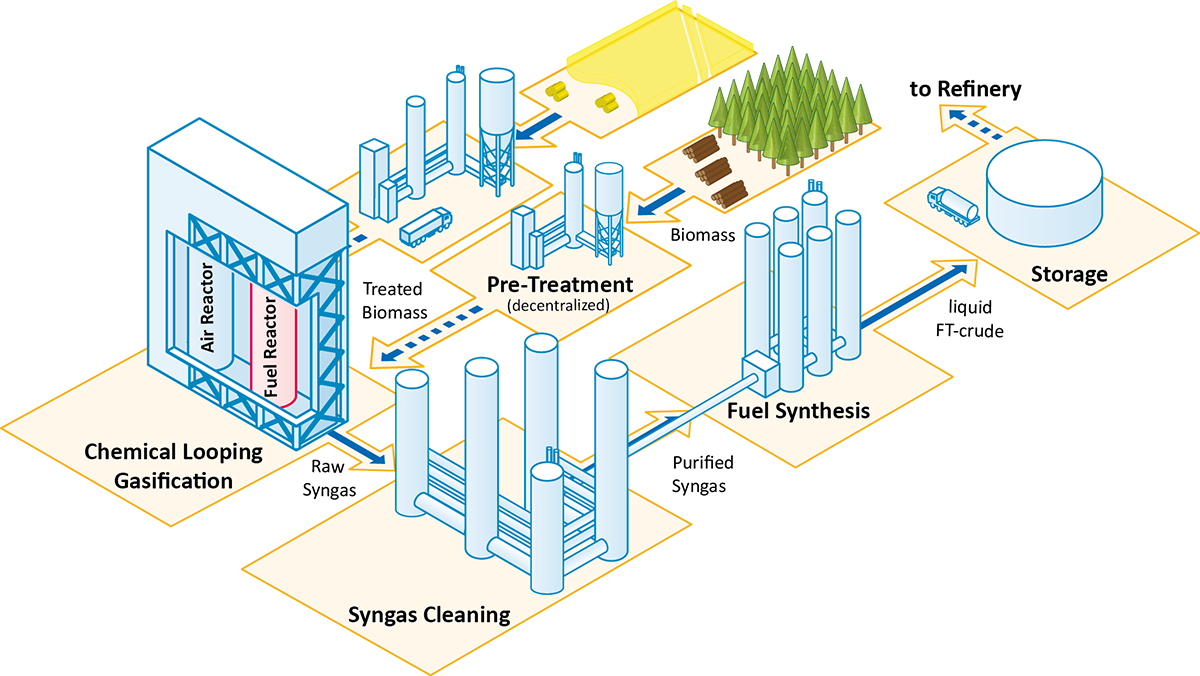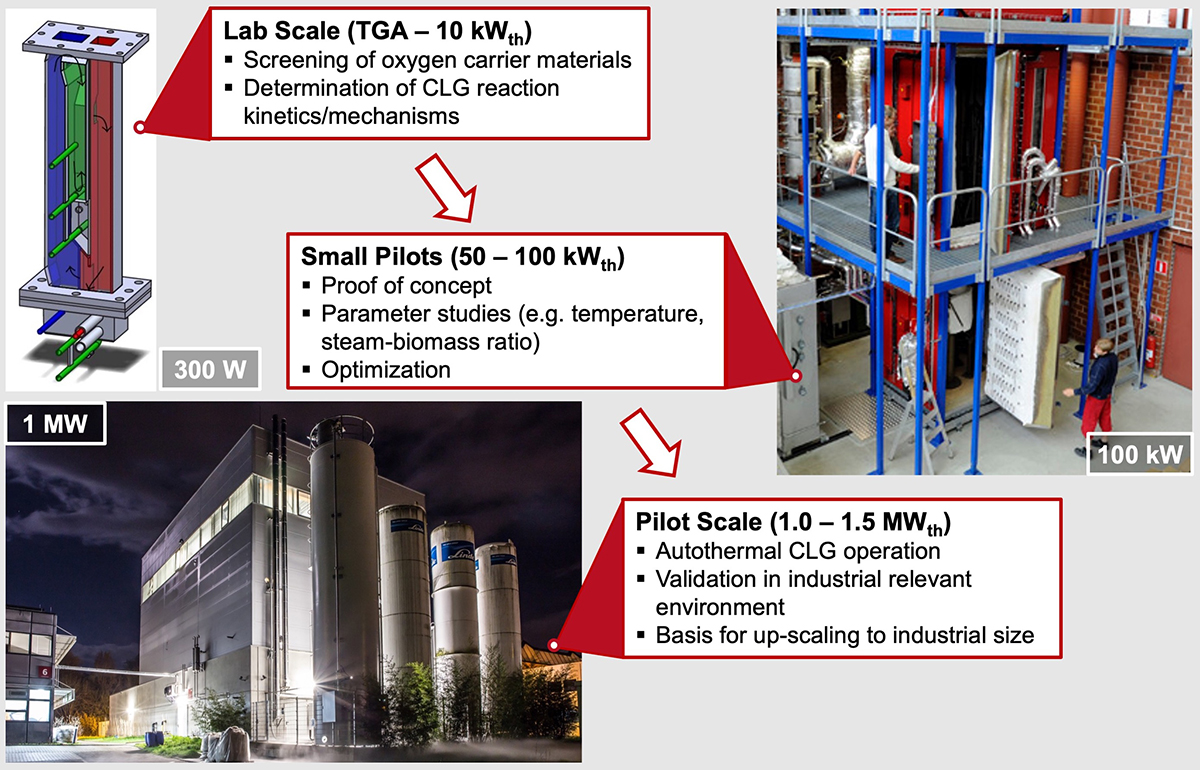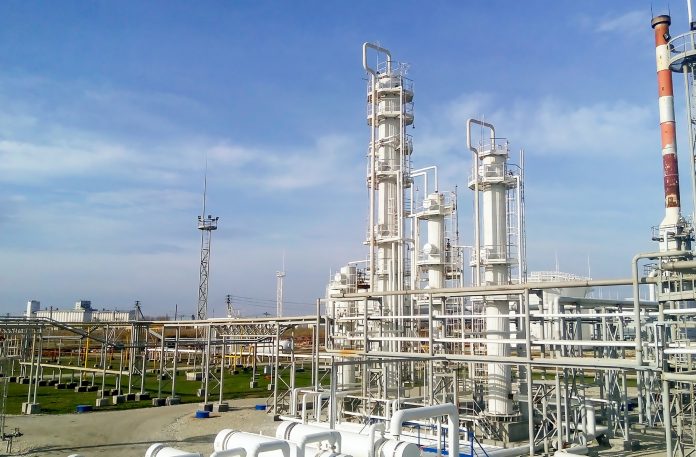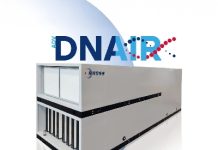The Horizon 2020 project CLARA, coordinated by the Technical University of Darmstadt, investigates a novel gasification technology to provide sustainable second-generation biofuels for the transportation sector in order to move it towards CO2 neutrality
In this context, biogenic residues, such as wheat straw, are to be converted into syngas by means of a new gasification technology and are thus made usable for downstream synthesis.
The synthesis gas obtained during gasification is then treated and purified to enable efficient fuel production, yielding the entire Biomass- to-Liquid (BtL) process, shown in Figure 1.

Chemical Looping Gasification (CLG) – Technology Development
To this end, twelve partners from academia and industry are working together with Technical University of Darmstadt on the further development and optimization of the novel BtL chain, with the aim of bringing it to market maturity.
Here, elevating the technology readiness level (TRL) of the novel gasification technology, Chemical Looping Gasification (CLG), beyond the state of lab-scale testing to semi-industrial demonstration (i.e. TRL 6), is key. The major advantage of the CLG technology is that the oxygen required for efficient feedstock conversion is supplied through the cyclic reduction and oxidation of an abundant, non-toxic metal oxide, a so-called oxygen carrier. Hence, CLG does not rely on a costly air separation unit, commonly required for oxygen-driven gasification processes. Moreover, CLG allows for an efficient capturing of the CO2 formed during the autothermal gasification step from the N2-free product gas in the downstream syngas purification unit, thus allowing for net negative CO2 emissions of the BtL process chain.
In order to achieve the goal of further advancing this auspicious technology, the gasification process was firstly investigated in small-scale facilities with thermal loads up to 10 kWth, to gain deeper insights into the process fundamentals, such as reaction kinetics and governing reaction pathways.
Subsequently, this knowledge was employed and extended in small pilots with thermal loads of 50 and 100 kWth. Inside these pilots, extensive parameter studies were carried out, laying the foundation in deriving a new process control concept, allowing for an efficient implementation and control in industrial size.

Moreover, important insights with regard to material selection, process requirements, operability, and process efficiency were obtained. The experimental endeavors aiming towards elevating CLG towards market maturity, illustrated in Figure 2, were accompanied by simulation and modelling efforts for validation of the experimental findings and deeper optimization through sensitivity analyses, amongst others.
1 MWth Pilot Testing
By combining the progress made both during the small-scale experimental investigations and process modelling, the pilot plant of the Technical University of Darmstadt (see Figure 3, left) has been extended to be able to demonstrate the entire BtL process chain in an industrially relevant environment, in the year 2021.
The tailored and extended plant was put into operation for the first time in March and April 2022. During this test campaign, the novel CLG technology (see Figure 3, right) was demonstrated in autothermal operation, i.e. without additional external energy input (e.g. electrical heating of the reactor system), for the very first time globally.
During the two-week test campaign in 1 MWth scale, important further insights into the governing sub-processes of the CLG technology and indispensable insights with regard to operability and process up-scaling were generated. Based on these findings, the gasification operation is now to be optimized in two further test campaigns and the downstream process steps, i.e. gas purification and fuel synthesis, are to be demonstrated.

Summary of large-scale implementation of biofuels
The data generated during small pilot testing and especially 1 MWth pilot operation will subsequently serve as an important basis for the large-scale implementation of the investigated concept for the production of liquid biofuels from biomass residues, which will be further expanded and refined in the further course of the project. More information on the CLARA project and updates on further progress can be found on the project homepage.

This project has received funding from the European Union’s HORIZON 2020 Research & Innovation programme under the Grant Agreement no. 817841
Please note: This is a commercial profile
© 2019. This work is licensed under CC-BY-NC-ND.











